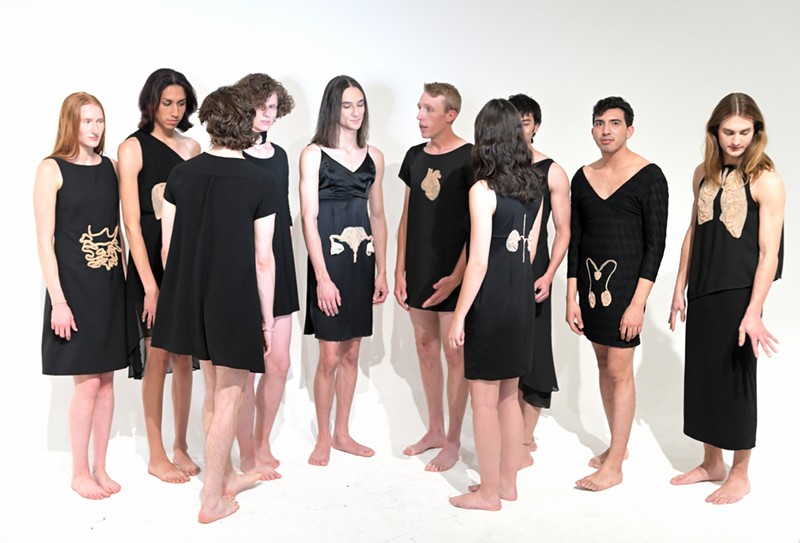“I always do statements,” says Marginal. “That’s how I communicate and how I want to talk. I think that's the best way to use your creativity and make the world better.”
Originally from Russia, Marginal moved to Denver six years ago after meeting her future husband on a visit with her mother, who had been living in Colorado for two decades. She says her artistic fashion statements often come from her acute awareness of society’s issues, from addiction to homelessness. She was once placed on a psychiatric hold when she had an emotional episode following a surgical procedure in Russia. Seeing the treatment of other patients inspired a Denver Fashion Week collection with models covered in white, who walked the runway in straitjackets while carrying large picture frames to draw attention and empathy to people living with mental health illnesses.

An image from Marginal's collection inspired by her stay in a mental health institution.
Photo by Alexandra Sheremet
But Marginal didn’t start out intending to be a fashion designer. She graduated from college with a finance degree and went to work in the oil industry. “But that industry is very harmful to the planet,” she says. “I didn’t want to be associated with that.” So she switched careers and went to fashion design school in Russia.
Her clothing now aligns with her sustainable mindset, often reusing found fabrics. Marginal's last collection was made from old towels, curtains and bed sheets. “I used all the towels at my parents’ house because they were renewing them,” she recalls.
While some may want new materials rather than used, Marginal sees the beauty in the deconstruction. Her sustainability efforts got her included in Meow Wolf’s upcoming Absolute Rubbish: A Trashion Show event, which happens Tuesday, September 19, and features creations by artists using repurposed materials. Marginal says that while she already has many pieces that would fit with that theme, she decided to show audiences something new and unexpected made from surprising materials not typically used for clothes.

Fashion designer Matilda Marginal says she is about making a message, not money.
Photo by Alexandra Sheremet
Such sentiments were echoed in a Marginal collection that featured nylon appliqués, crafted to look like human organs as a metaphor for the beauty inside. “People are so focused on being beautiful on the outside,” she says. “They forget that what is inside you is more important.”
Marginal admits that creating art helps her cope with the things she sees that upset her. “To be honest, I don’t know what I would do if I couldn’t express myself.”
The audience for Marginal clothing tends to lean toward those who, like the designer, express themselves in a brave and uncompromising way. She says she doesn’t care if some people dislike her clothing: “I respect others’ opinions. I don’t try to change their mind. If someone doesn’t understand me, it’s because we have different views, we have different baggage.”
In addition to selling online, Marginal has a brick-and-mortar store at 2820 East 17th Avenue, where she works on most of her ideas; the space is open for shopping on Fridays and Saturdays. She says most of the clothing in her shop is samples, and she doesn’t create different sizes to avoid waste. If someone likes a piece, she can make it in their size if she still has the scrap material, or she will make something from other repurposed material.
While Marginal says the Denver fashion scene is supportive of her work, there is a small audience for it, and the fashion business can be a struggle financially. But Marginal says it’s important to her to be independent so she can do the work she wants, and she appreciates those who understand it. “It’s not about the money," she says. "I want to say something. When somebody buys something of mine and wears it, I feel it’s like my soulmate. We have a connection.”
Marginal at Absolute Rubbish: A Trashion Show, 7 p.m. Tuesday, September 19, Meow Wolf, 1338 First Street, Denver. Tickets are $40-$65.













